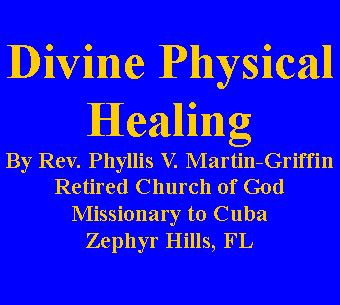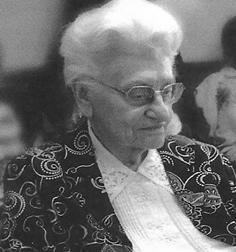

|
Texts: Isaiah 35:4-6; Matthew 8:16-17; Luke 7:21, 22; Matthew 4:23.
I. What it is not:
A. Spiritual healing of the soul. 1. There is the recovery of the soul from its sinful condition which may properly be called divine healing. 2. Some hold this to be the only kind of healing intended for us, but we are discussing the healing of the body from physical ailments.
B. Natural or human means. 1. Natural recovery. Nature tends to cure our ills, and In many instances the afflicted fully recover through the processes of nature. 2. Such healing is the work of God, and He should have credit for it, but it is not what we mean by divine physical healing. 3. Nature may be assisted in the work of recovery by human skills and the use of remedies. Whatever value these may have they are not divine healing.
C. Psychological healing. 1. The mind has power over the body, and in some kinds of afflictions the mental attitude of the patient has much to do with his recovery. 2. Strong minds influence others. Some with strong minds are able to exercise a beneficial influence over others, and through this means healings are accomplished. 3. Some ascribe the healings of Christ to this power alone, but they are wrong. 4. Mind healing is inadequate because, while the mental attitude is beneficial in some cases, many are beyond the power of such assistance. 5. Healings wrought through divine healing prove it to be superior to psychological.
D. Satanic healing. 1. The devil does heal, for he is represented as having power to do miracles. 2. He does these in heathenism, spiritualism, etc. 3. Christ denied the charge that His healing was satanic healing. 4. To class all supernatural healing with spiritualism, etc., and attribute all to the devil, as some do, approaches blasphemy. 5. Divine healing may be defined as the healing of man’s physical and mental ailments by the power of God operating through the Spirit and appropriated by faith.
II. The facts of healing
A. Bible examples: The recorded cases of healing in the Bible are so many they prove that it was known and experienced by God’s people in all ages, and the details given in various cases prove that it was actual physical healing of the body, including many that are counted incurable.
B. Modern experiences. Many living people testify to having been healed by the power of God. The variety of these healings is as great as those found in the Bible.
III. The purpose of healing
A. To attest Christ’s divinity. 1. It was effective to this end. a. Jesus said, “The same works that I do, bear witness of me” (John 5:36). b. Nicodemus said, “We know that thou art a teacher come from God: for no man can do these miracle that thou doest, except God be with him” (John 3:2). 2. Such an attestation is not now required in the same degree as at the beginning. The divinity of Christ having been thoroughly established, miracles are not now always essential to establish faith in Christianity. From this fact some argue that miracles have ceased. 3. Such evidences are still valuable. But if we were left without such signs we could still be without excuse for refusing to believe in Christ. Nevertheless healings are a wonderful incentive to faith both in the unbeliever and in the Christian.
B. To manifest God’s love. 1. Any miracle proves God’s power. Had Jesus turned sticks to snakes, dried up rivers, or given signs in the heavens, He could have thus proved his divine power. 2. His healings show compassion. 3. He steadfastly refused to perform needless miracles just to prove that He could. 4. God’s love is shown. 5. Christ’s claim to divinity is more completely established by the manifestation in His healing power of two of God’s attributes—omnipotence and love. 6. A higher conception of God is also revealed.
IV. The place of healing in the plan of redemption
A. Based in the need. 1. The Fall affected the physical body, pain and sorrow were multiplied, and the privilege of the tree of life was denied. 2. A complete redemption is provided in the resurrection. At that time all the physical ill effects of the fall will be overcome.
B. A subject of prophecy, Isaiah 35:4-6 with Luke 7:18-21; and Isaiah 53:5b with Matthew 8:16-17. 1. It is a characteristic of Christ’s work. 2. It is not incidental in His life, but an integral part of His mission. 3. It is associated with salvation. 4. In salvation it has an important and permanent place in the plan.
C. Secured through Christ’s sufferings. 1. The prediction of Isaiah 53:3–5 with Matthew’s reference to it, represents healing as secured through the sufferings of Christ.
V. The permanency of healing
A. The last commission contains it. 1. Mark 16:18. The commission to all the world and to every creature contains the promise of healing. 2. Matthew 28:18–20. The disciples practiced healing at the command of Jesus and they were to teach the converts in all nations to the end of the world to observe it.
B. The Apostles practiced it. 1. See the many healings in the Book of Acts. 3. It is listed among the gifts placed in the church, 1 Corinthians 12:7-11; 27-31.
C. The nature of Christ requires that healing continue. 1. He is the same yesterday, today, and forever, Hebrews 13:7-8.
The Great Physician The Great Physician now is near, the sympathizing Jesus; He speaks the drooping heart to cheer, O hear the voice of Jesus!
Sweetest note in seraph song, Sweetest name on mortal tongue; Sweetest carol ever sung, Jesus, blessed Jesus. William Hunter
|

|
Rev. Phyllis Martin-Griffin On her 90th birthday |